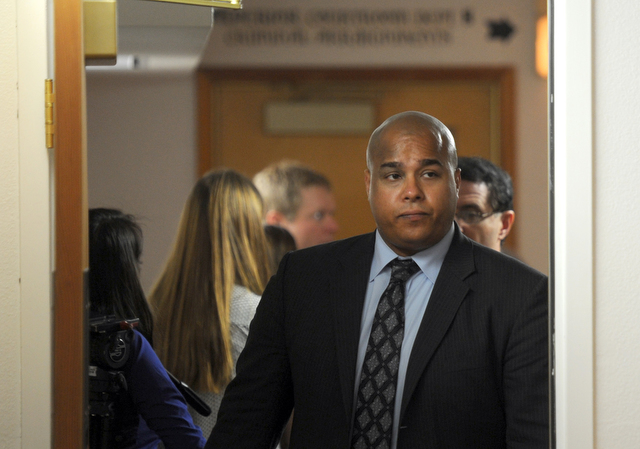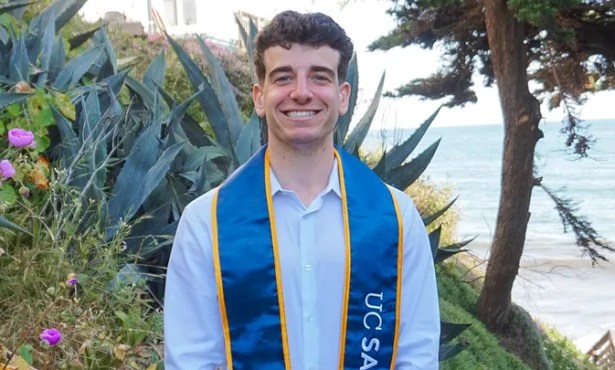Feds Want Incarceration for Former Jail Deputy
Prosecutors Demand 12 Months for Guard Convicted for Obstruction of Justice

Federal prosecutors with the U.S. Attorney’s Office in Los Angeles filed legal papers arguing that former Santa Barbara County Custody Deputy Christopher Johnson should serve 12 months behind bars as punishment for the obstruction of justice charge for which he was convicted of last September.
Johnson was one of two jail deputies brought up on excessive force charges — along with Robert Kirsch — for taking down a handcuffed jail inmate and then beating him; neither were convicted. But Johnson was convicted for obstruction of justice for not reporting that Kirsch kicked and kneed the inmate in his written report of the incident, which took place on June 17, 2013.
Even though the U.S. Probation Office has recommended Johnson be sentenced to one year of probation, U.S. Attorney Bruce Riordan has insisted incarceration is necessary because of the gravity of the offense, as well as to send a message. “Custodial deputies, like all law enforcement officers, must report accurately on their use of force incidents or the criminal justice system will be tarnished,” wrote Michael Azat, one of Riordan’s deputy prosecutors, in court pleadings.
Azat contended that Johnson has shown “no contrition, no acknowledgement of the seriousness of his intentional violation of the law, and no remorse.” Johnson compounded his cover-up, Azat charged, by providing false testimony during two trials.
The precipitating incident involved the use of force against inmate Charles Owens two years ago, then in custody on charges of rape and murder. He’s since been convicted of both and is serving a life-behind-bars sentence. Owens, then handcuffed, was reportedly engaged in a verbal confrontation with Johnson, then an eight-year custody deputy.
Johnson — accompanied by Kirsch — walked Owens down a jail hallway into a different holding cell. There, Johnson took Owens to the ground, whereupon he was repeatedly kicked and kneed by Kirsch. Johnson was convicted of obstructing justice because his written report included no mention of any knee strikes or kicks.
Owens checked himself into the jail infirmary, complaining of sore ribs and that he’d spat up blood. Attorneys for the two custody deputies argued Owens exaggerated and that he sustained only bruises. Sheriff Bill Brown wasted little time firing the two deputies and, rather than filing charges of her own, District Attorney Joyce Dudley referred the case to the U.S. Attorney’s Office for prosecution.
The incident resulted in two trials. In the first, the jury was hung. In the second, the jurors found the two deputies not guilty of excessive force. The case hinged on a jail-house video of the incident captured on a wall-mounted security camera. Kirsch’s defense attorney Bill Hadden made a compelling case that the security camera — 40 feet away from where the incident occurred — should be taken with more than a few grains of salt.
Because the camera was geared to record at a slow speed, events seemed faster, jerkier, and more violent than they actually were when played back at normal speed. Likewise, Hadden argued that the video — when played at normal speed — failed to show the extent to which Owen was resisting. The two officers, he insisted, were following established protocol in subduing an inmate refusing to be subdued.
Attorneys for the two deputies insisted they were victims of political retaliation by Sheriff Brown. They had complained that the jail was dangerously understaffed. And when Dudley referred the case to Riordan’s office, Johnson’s attorneys charged that was a political evasion by the district attorney, who they claimed didn’t want to risk trying the case locally when she was running for re-election. Dudley was unopposed in that race.
Riordan cited both those assertions as evidence that Johnson has failed to acknowledge the seriousness of his offense. Dudley declined to comment on the case and said her office is still waiting for certain reports before determining whether to file charges of its own.
Johnson’s attorney Muna Busailah was not available for comment. Johnson’s sentence will be determined in federal court on January 11.



